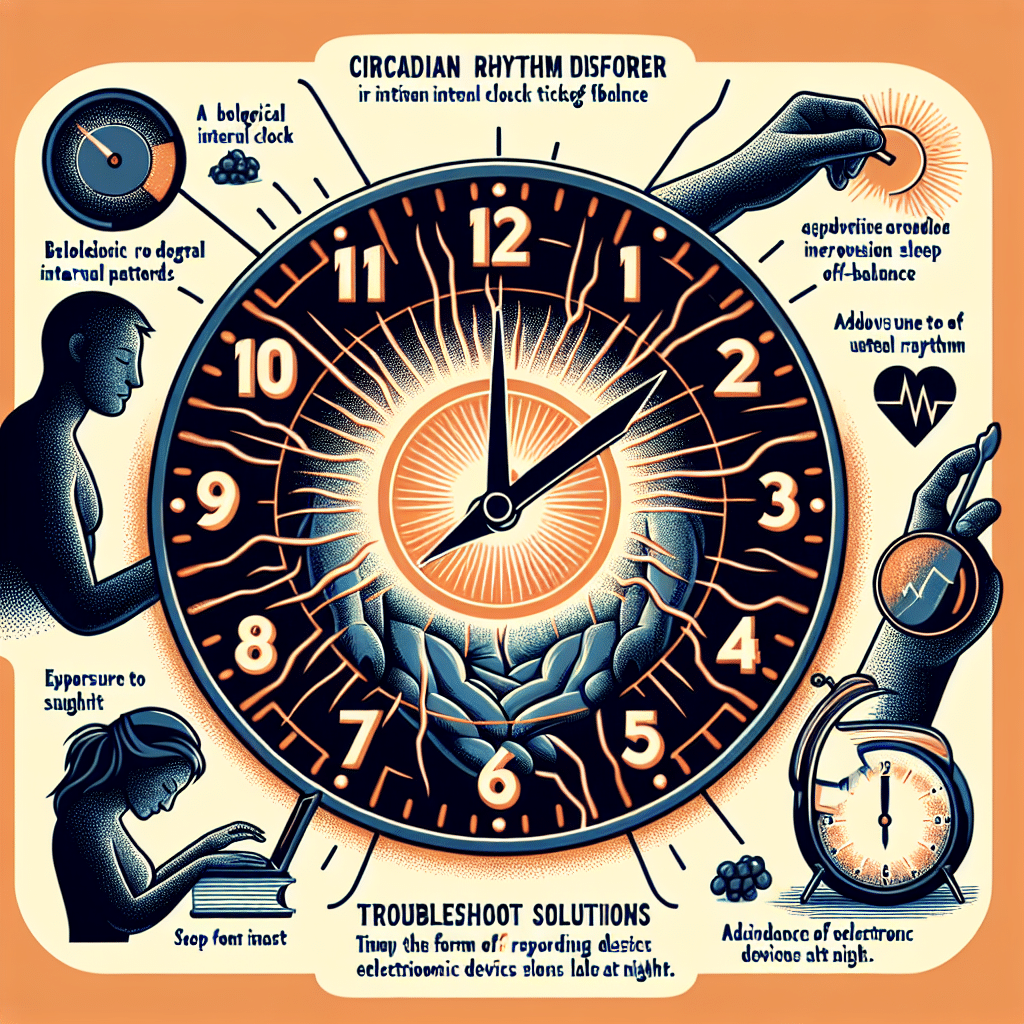Understanding Circadian Rhythm Disorders
Circadian rhythm disorders occur when the body’s biological clock is disrupted, leading to misalignment between the internal clock and the external environment. Symptoms often include insomnia, excessive daytime sleepiness, fatigue, and difficulty concentrating. Common disorders include Delayed Sleep Phase Disorder (DSPD), Advanced Sleep Phase Disorder (ASPD), Shift Work Sleep Disorder (SWSD), and Non-24-Hour Sleep-Wake Disorder (Non-24).
Identifying Circadian Rhythm Disorders
Before seeking solutions, it’s critical to identify specific symptoms. Noticing periodic sleep troubles, such as difficulty falling asleep or waking up too early, can help in determining if a circadian rhythm disorder is present. Keeping a sleep journal for a couple of weeks, documenting bedtimes, wake times, and daily activities can aid healthcare professionals in diagnosing the disorder.
Lifestyle Modifications
1. Light Therapy
Light exposure plays a crucial role in regulating circadian rhythms. For individuals with DSPD, light therapy in the morning can be particularly beneficial. This involves sitting near a specially designed light box for about 20 to 30 minutes shortly after awakening. Patients with Non-24 may find evening light therapy effective to help reset their internal clock.
2. Sleep Hygiene Practices
Adopting rigorous sleep hygiene practices can elevate the quality of sleep. This includes:
- Maintaining a consistent sleep schedule, going to bed and waking up at the same time every day.
- Creating a comfortable sleep environment, such as a cool, dark, and quiet room.
- Limiting screen exposure before bedtime, as blue light can inhibit melatonin production.
3. Adjusting Meal Times
Eating meals at consistent times can help regulate the body’s internal clock. Avoiding heavy meals close to bedtime is recommended. It may also benefit those with SWSD to synchronize meal schedules according to their work shifts.
Behavioral Therapy
Cognitive Behavioral Therapy for Insomnia (CBT-I) can be a valuable tool for correcting maladaptive sleep behaviors associated with circadian rhythm disorders. CBT-I focuses on changing thoughts and behaviors surrounding sleep, helping individuals with sleep onset and maintenance insomnia rooted in these disorders.
Melatonin Supplements
Melatonin, a hormone naturally produced by the body, helps regulate sleep-wake cycles. Supplementing with melatonin can benefit those suffering from specific circadian rhythm disorders, particularly in adjusting the timing of sleep. It is generally recommended to take melatonin 30 minutes to an hour before the desired sleep time.
- Dosage: Typical doses range from 0.5 mg to 5 mg.
- Timing: For DSPD, supplements should be taken in the evening, while those with ASPD may find morning doses more effective.
Chronotherapy
Chronotherapy involves systematically adjusting bedtime to gradually shift a person’s sleep-wake cycle. This method is often utilized for DSPD by delaying bedtime in small increments until the desired sleep schedule is achieved. Attention must be paid to maintaining consistency to solidify the new rhythm.
Pharmacological Interventions
For some individuals, pharmacological aids may be necessary. Medications like modafinil are often prescribed for excessive sleepiness associated with SWSD, whereas sedative-hypnotics may be used to assist sleep onset. Always consult a healthcare provider when considering medication, as individualized assessment is essential.
Professional Support
Consulting with a sleep specialist or healthcare professional specializing in circadian rhythm disorders is crucial. They can provide tailored strategies and ensure that treatment aligns with other health considerations. These professionals often employ sleep studies which can elucidate underlying issues contributing to circadian disruption.
Integrating Technology
Several wearable devices and applications can monitor sleep patterns and provide insights into circadian rhythms. These technologies can be beneficial for tracking sleep metrics such as duration, quality, and even heart rate variability, thus helping individuals and healthcare providers make informed decisions about treatment.
Importance of Social Support
The role of social support in managing circadian rhythm disorders should not be underestimated. Engaging with support groups, whether in-person or online, can provide emotional comfort and practical strategies from others facing similar challenges. Sharing experiences can help individuals feel less isolated in their struggles.
Dietary Influences on Circadian Rhythms
Diet has a substantial impact on sleep and circadian rhythms. Foods rich in magnesium, such as spinach and nuts, can promote relaxation and improved sleep. Eating complex carbohydrates earlier in the day can also enhance energy levels and support alertness.
Research and Ongoing Studies
Continuous research in the field of circadian rhythms offers promising insights and advancements in diagnosing and treating these disorders. Keeping abreast of the latest studies through reputable medical journals can help patients stay informed about new treatment protocols.
Mindfulness and Relaxation Techniques
Incorporating mindfulness practices such as meditation or yoga can enhance mental well-being and reduce stress, promoting better sleep. These techniques, when practiced regularly, can be valuable for aligning the mind and body to facilitate natural sleep cycles.
Alternative Therapies
Some individuals may seek alternative remedies like acupuncture or herbal treatments to address sleep disturbances. Always consult with a healthcare professional before undertaking alternative therapies to ensure safety and compatibility with existing treatments.
Conclusion of Strategies
A multi-faceted approach combining lifestyle changes, technology integration, professional guidance, and alternative therapies can create a robust framework for managing circadian rhythm disorders effectively. By proactively addressing the elements that affect sleep, individuals can significantly improve their quality of life and overall health.
Remaining attentive to routines and integrating solutions tailored to individual needs will foster resilience against these complex disorders.
